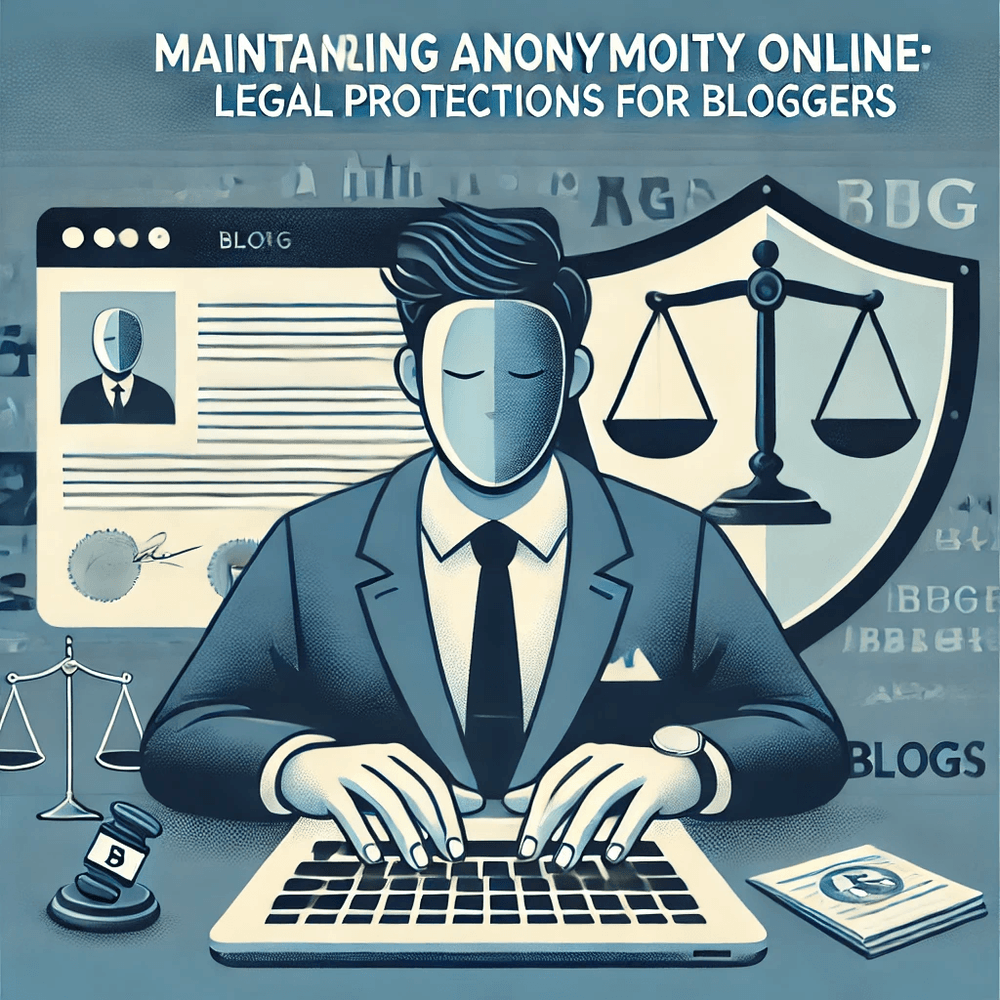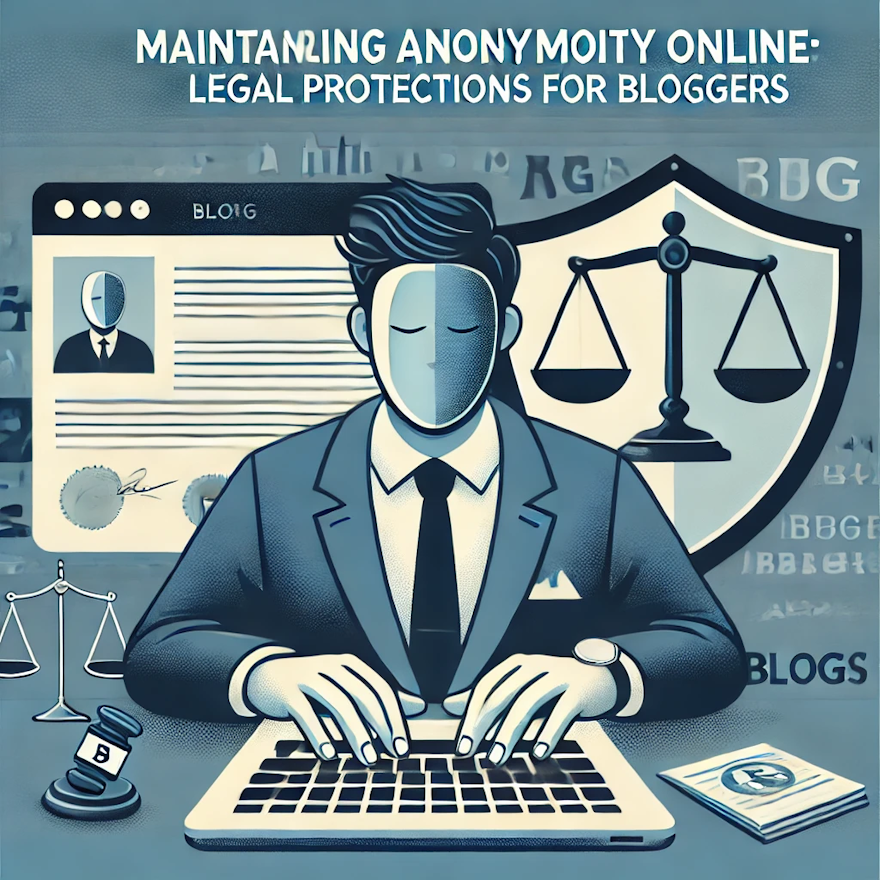Maintaining Anonymity Online: Legal Protections for Bloggers

In the digital age, blogging has emerged as a powerful medium for expression, allowing individuals to share their thoughts, experiences, and expertise with a global audience. However, with this reach comes the risk of exposure, making the protection of one's identity a significant concern for many bloggers. Maintaining anonymity online is not just a personal preference but a critical issue with legal implications. This comprehensive guide explores how bloggers can protect their identity, the legal precedents supporting anonymity, and recent cases that highlight these issues.
Why Anonymity Matters
Blogging anonymously offers several benefits:
- Freedom of Expression: Anonymity allows bloggers to express their views without fear of retribution or backlash. This is particularly important in countries with restrictive regimes or for individuals discussing sensitive topics.
- Personal Safety: For bloggers addressing controversial issues, anonymity can be a safeguard against harassment, threats, or physical harm.
- Professional Security: Many bloggers wish to separate their online personas from their professional lives to avoid conflicts of interest or potential repercussions at work.
- Privacy: Maintaining anonymity helps protect personal privacy and prevent unwanted intrusion into one's personal life.
Legal Protections for Anonymity
The right to anonymous speech has been recognized and protected in various jurisdictions, primarily through court rulings that highlight the importance of free expression.
United States
In the United States, the First Amendment provides robust protection for anonymous speech. Key legal precedents include:
McIntyre v. Ohio Elections Commission (1995): The U.S. Supreme Court held that an individual's right to distribute anonymous campaign literature is protected under the First Amendment. This case established that anonymity is a shield from the tyranny of the majority and an important element of free speech.
Doe v. Cahill (2005): In this case, the Delaware Supreme Court set a high standard for revealing the identity of anonymous online commenters. The court required plaintiffs to provide substantial evidence of defamation before compelling the disclosure of an anonymous blogger's identity.
Dendrite International, Inc. v. Doe No. 3 (2001): This case established the "Dendrite test," a four-part test used by courts to balance the plaintiff's need for disclosure against the anonymous speaker's right to remain anonymous. The test includes:
- Notification of the anonymous party about the disclosure request.
- Specification of the allegedly defamatory statements.
- Presentation of evidence supporting the plaintiff's claims.
- Balancing the defendant's First Amendment right to anonymous speech against the plaintiff's need for disclosure.
European Union
The European Union (EU) also recognizes the importance of anonymity, though protections are often framed within the context of privacy laws.
General Data Protection Regulation (GDPR): The GDPR provides comprehensive privacy protections, including the right to data minimization and the right to be forgotten. While not explicitly about anonymity, these rights support the ability to control personal information and protect one's identity online.
Case Law: Various rulings from the European Court of Human Rights (ECHR) have underscored the importance of privacy and anonymity, particularly in cases involving journalists and whistleblowers.
International Perspectives
Many countries recognize the right to anonymous speech, though the extent of legal protections varies widely. For example, Canada has strong protections for free speech and anonymity, while countries like China have more restrictive policies.
How Bloggers Can Protect Their Identity
While legal protections are crucial, bloggers must take proactive steps to safeguard their anonymity. Here are practical strategies:
1. Use Pseudonyms
Creating a pseudonym is a fundamental step in maintaining anonymity. This separates your real identity from your online persona and provides a layer of protection against those seeking to uncover your identity.
2. Secure Your Accounts
Ensure that your email, social media, and blogging accounts are secured with strong, unique passwords. Use two-factor authentication (2FA) to add an extra layer of security.
3. Utilize Privacy Tools
Privacy tools and software can help protect your identity:
- Virtual Private Network (VPN): A VPN encrypts your internet connection, masking your IP address and making it harder for others to trace your online activities.
- Tor Browser: Tor provides anonymity by routing your internet traffic through a network of servers, making it difficult to trace.
- Encrypted Email Services: Use encrypted email services like ProtonMail to secure your communications.
4. Be Cautious with Personal Information
Avoid sharing personal details that could reveal your identity. This includes not only your name but also information like your location, workplace, and any identifiable habits or routines.
5. Separate Personal and Blogging Activities
Maintain separate devices or accounts for your blogging activities. This minimizes the risk of accidentally revealing your identity through cross-referencing personal and professional data.
6. Legal Protections and Support
Stay informed about the legal protections available in your jurisdiction. Joining organizations that advocate for digital rights, such as the Electronic Frontier Foundation (EFF), can provide access to resources and legal support if your anonymity is threatened.
Recent Cases Highlighting Anonymity Issues
Several recent cases illustrate the challenges and legal battles surrounding online anonymity:
1. The Slapps (Strategic Lawsuits Against Public Participation) Phenomenon
SLAPPs are lawsuits filed to intimidate or silence critics by burdening them with the cost of a legal defense. These cases often target anonymous bloggers or commenters. Anti-SLAPP laws in many states provide protections for these individuals by allowing for the early dismissal of meritless cases.
2. Anonymous Blogging in Political Activism
In many countries, political activists use anonymous blogging to share information and mobilize support. For example, in Hong Kong, anonymous bloggers played a crucial role during the pro-democracy protests. However, the Chinese government’s increasing surveillance and crackdown on dissent have made maintaining anonymity more challenging.
3. Defamation Cases
Defamation suits often involve attempts to uncover the identity of anonymous bloggers. In the case of Doe v. Hadley, a blogger was sued for defamation, but the court ruled that the plaintiff must present substantial evidence of the defamatory statements before the blogger's identity could be revealed.
4. Whistleblower Protections
Whistleblowers often rely on anonymity to expose wrongdoing without risking their careers or personal safety. Legal protections, such as the Whistleblower Protection Act in the U.S., offer some safeguards, but challenges remain, particularly in ensuring these protections extend to online activities.
5. Revenge Porn and Cyberbullying
Anonymity can be a double-edged sword, as it can be abused for malicious purposes like revenge porn or cyberbullying. Legal measures, such as the U.K.'s Revenge Porn Helpline and various anti-cyberbullying laws, aim to address these issues while balancing the right to anonymous speech.
Balancing Anonymity and Accountability
The debate over online anonymity often centers on balancing the right to anonymous speech with the need for accountability. While anonymity protects free expression, it can also shield harmful behavior. Legal frameworks and court rulings strive to find this balance, ensuring that the right to anonymity is preserved while holding individuals accountable for unlawful actions.
Ethical Considerations
Bloggers must also consider the ethical implications of their anonymity. While it provides protection, it should not be used to spread misinformation, engage in defamation, or harm others. Responsible use of anonymity involves adhering to ethical standards and respecting the rights and reputations of others.
The Role of Platforms
Online platforms play a crucial role in protecting or exposing anonymity. Companies like Google, Twitter, and Facebook have policies and legal teams to handle requests for user information. Bloggers should familiarize themselves with these policies and choose platforms that prioritize user privacy and offer robust protections against unwarranted disclosure requests.
Conclusion
Maintaining anonymity online is a complex but essential aspect of modern blogging. Legal protections, while robust in some jurisdictions, require bloggers to be proactive in safeguarding their identities. By understanding the legal landscape, employing effective privacy tools, and adhering to ethical standards, bloggers can navigate the challenges of anonymity and continue to express themselves freely and safely.
The evolving digital landscape and legal frameworks will continue to shape the future of online anonymity. Staying informed and vigilant is crucial for bloggers who wish to maintain their privacy while engaging in the dynamic world of online expression.
Sources:
- McIntyre v. Ohio Elections Commission, 514 U.S. 334 (1995).
- Doe v. Cahill, 884 A.2d 451 (Del. 2005).
- Dendrite International, Inc. v. Doe No. 3, 775 A.2d 756 (N.J. Super. Ct. App. Div. 2001).
- General Data Protection Regulation (GDPR), Regulation (EU) 2016/679.
- Electronic Frontier Foundation. (n.d.). Bloggers' Legal Guide. Retrieved from https://www.eff.org/issues/bloggers/legal.
- Revenge Porn Helpline. (n.d.). Retrieved from https://www.revengepornhelpline.org.uk/.
![[object Object]](https://umsousercontent.com/lib_ygSQXDNiieGKRILa/a2xdxo2codu8yakd.jpg?w=108)
